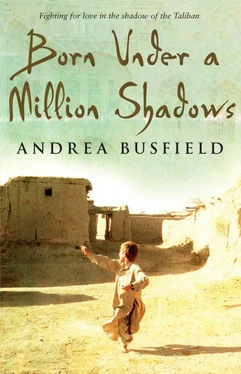As we got nearer, my stomach began to tickle as Mulallah’s face came into my head, and I prayed that Baba Gul’s hut would still be where we had left it months before.
As we bounced up the stony track—the main road, as far as I could see—I thought I recognized the field where we had played together in the winter sun, but I couldn’t see any sign of the old man’s goats or my friend. Under my skin, my heart began to move faster as we missed the turn I was sure took us toward Baba Gul’s hut. I looked at Georgie, who also seemed confused.
“Zalmai,” she said to the driver, “where are we going?”
“Baba Gul has a new place,” was all he said.
Ahead of us the mountains that joined with Pakistan grew larger before our eyes, and we passed strange rocky fields that looked like ancient steps until we turned left at some stone walls bordering fields of flowers. About ten minutes later, up a dusty track that kicked clouds of sand into our mouths through the open window that Georgie shut too late to save us, we came to a stop outside a small house. In front of it stood rows of young trees, fenced off from the mouths of the hungry goats that grazed nearby. They were Baba Gul’s goats, and they looked much thinner than the last time I’d seen them because their coats had now been taken from them to be made into coats for people.
We followed Zalmai out of the car.
“Agha Baba Gul Rahman!” he shouted.
Mulallah’s mother came out of the curtained doorway and into the sunshine. She looked fatter than I remembered, and the weight seemed to have ironed out some of the creases in her face. She came over to greet Georgie, smiling widely with her hands stretched out. When she reached her she stood on her toes to take hold of her face, then she kissed her six times, three on each cheek.
Georgie kissed her back, but I could see the confusion covering her eyes as Mulallah’s mother spoke to her in quick, happy Pashto.
“She says may Allah bless you with a thousand wishes—you are her sister,” I explained as Georgie was pulled toward the house.
“Tell her that’s very kind and I hope God repays her kindness in a million more happy ways,” Georgie replied, so I did.
At the door we kicked off our shoes and followed Baba Gul’s wife inside, where we found Mulallah and two of her brothers sweeping the dust from the long cushions, ready for us to sit down.
“Salaam aleykum,” Mulallah said, grabbing Georgie’s waist in a huge hug before giving her hand to me. Her brothers shyly held out their own hands and giggled their welcome.
Baba Gul was nowhere to be seen.
“You live here now?” I asked, surprised and happy at the family’s good fortune. Either they had combed a lot of goats that spring, or Baba Gul had found the luck of the devil in his card games.
“Yes, it is beautiful, isn’t it?” Mulallah replied. “And to think I was ready to die a few months ago.”
Over cups of wet tea and plates of dry cake, Mulallah and I shared the job of explaining to Georgie the words of Baba Gul’s wife. It was almost unbelievable what had happened to their family in such a short period of time, and I was glad their story had a happy ending because I don’t think I could have coped with another tragedy.
After the winter, Baba Gul had apparently got into serious trouble with his gambling, and one day he returned home unable to look his own wife in the eyes. Without a word to anyone, he took Mulallah’s hand and practically dragged her to the next village, leaving his wife beating her chest in the wooden hut and crying rivers of tears.
As they walked down rocky lanes, Baba Gul said nothing to Mulallah. She grew increasingly afraid the more he refused to answer her questions until her own eyes filled with tears for a reason she didn’t know.
When they got to the village, she found out why her father could not speak: he was dumb with shame because he had traded his debt to another man using his daughter. Mulallah nearly fainted with horror when she realized what was happening. Her father had sold her to a man she would soon have to call “husband.”
As she backed into the wall of the house she was now expected to live in, the man shook hands with her father. His fingers were thin and dark, and they bent inward with age. With a terrified scream at the thought of those fingers touching her, Mulallah pulled open the door of the house and ran for her life, even though she knew this was the biggest insult she could ever have shown her father, not to mention the man who was about to become her husband. As she ran she knew she was as good as dead because by saving herself she had brought dishonor on her family.
Disappearing into the fields surrounding the village, she sank to her knees and crawled through the growing plants, not daring to raise her head for hours on end as her hands and knees became ripped on the sharp rocks beneath her. For two whole nights she slept under bushes and inside holes that time had made in the hills and mountains, surviving on the berries and raw potatoes she stole while everyone else was asleep in their beds.
By the third day Mulallah realized she could not live like this forever, but she couldn’t go back to her family or the man she had been sold to. So she looked deep inside herself and chose to take her life. Even though it was a terrible sin, one of the worst in fact, she prayed that God would forgive her because she was still a child.
As she waited for night to fall, sitting in a cave hidden by bushes, she made her plan. She would sneak into the village when the sun had gone and steal a can of gas from one of the houses. She would then set herself free in fire.
Of course, Mulallah was terrified by what she was about to do. She knew it would hurt, and she was afraid that God wouldn’t forgive her at all, and she would continue to burn in the next life. On top of that she was heartbroken at the thought that she would never again see her mother, and as she quietly cried to herself she imagined her mother’s voice calling her. “At first I thought I was dreaming,” explained Mulallah, “even though I wasn’t sleeping. And I thought maybe this was the way of death when you had made the decision to embrace it. But it sounded so real. I really felt my mother calling for me.”
Unable to stand the craziness her mother’s shouts were producing in her head, Mulallah moved from the cave where she had been hiding and looked down into the valley. A small woman dressed in green with the blue of her burka pulled back from her face was wandering through the grass. She was shouting Mulallah’s name, and Mulallah realized she hadn’t been dreaming at all. Her mother had come for her.
Unable to stop herself, even though she was certain she would be taken back to the old man who was to be her husband because her mother could never defy her own husband, Mulallah ran out and threw herself into her arms. Wrapped in her mother’s love, she cried and cried until her exhausted eyes could no longer make any more tears.
“It’s okay, it’s okay,” her mother cried with her, placing soft kisses all over her daughter’s face. “We are safe now, Mulallah. You are safe.”
As Mulallah quieted, her mother took her hand and walked her back to their home. On the way she told her how she had almost been broken by grief by what her husband had done, and by the news that Mulallah had run away. But then the pain turned to crazy anger, and in a fit of blind rage she walked all the way to Haji Khan’s village almost half a day away to plead with him to do something. He was the strongest man in the province, and if he intervened, then maybe Mulallah could be saved.
Amazingly, Haji Khan was there when she arrived, and when he came to the door of the house Mulallah’s mother fell exhausted at his feet, begging him for help. When Haji Khan heard what had happened, he gently told her not to worry and that she should go and find her daughter and bring her home. He then traveled to the man who had bought Mulallah, and he paid for her freedom.
Читать дальше












